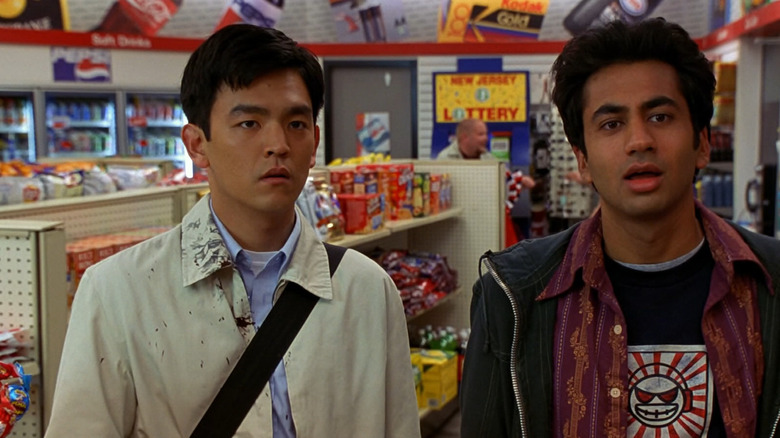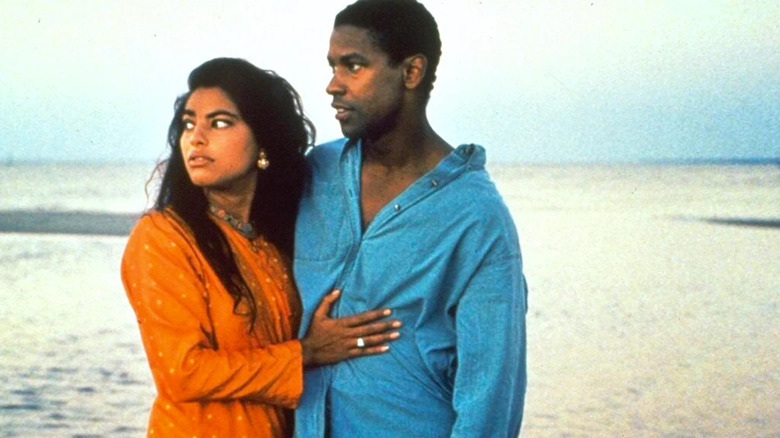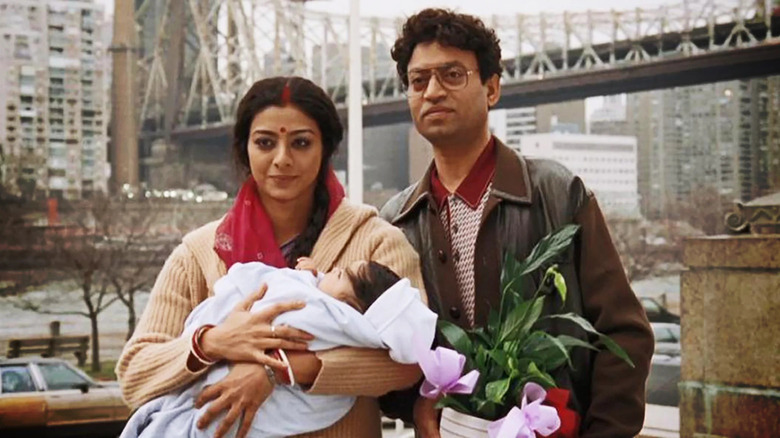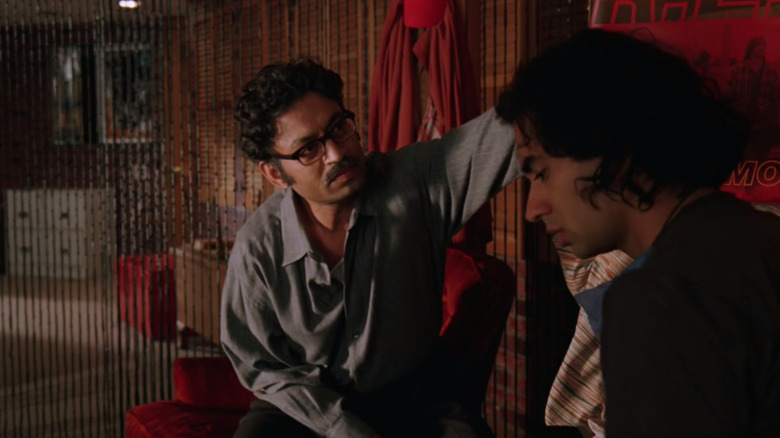How Harold And Kumar Helped Kal Penn Land The Namesake's Lead Role
One of the greatest novels of the 21st century so far, Jhumpa Lahiri's "The Namesake" nearly defies adaptation. Spanning multiple decades, languages, and metropolises, Lahiri's novel follows the life of Gogol Ganguli, a first-generation Indian American, and his oft-contentious relationship with his ethnic identity. Luckily, the best filmmaker for the job stepped up to the plate and made an adaptation of "The Namesake" that radiates as much charm and melancholy as the novel does.
The director in question is Mira Nair, who at the time was best known for helming "Salaam Bombay!" (which was nominated for an Oscar), "Mississippi Masala," and "Monsoon Wedding." With most of her work touching on the Indian diaspora, it was only fitting that she would quickly snag the film rights for "The Namesake." Who she would cast in the all-important role of Gogol, however, remained up in the air.
What led to Kal Penn — the actor who at that point was most famous for playing one half of the stoner duo in "Harold & Kumar Go to White Castle" — eventually landing the role of Gogol has everything to do with his established adoration of Nair's work. Apparently, his time on the set of "Harold & Kumar" was also an essential influence on Penn's dogged pursuit of playing Lahiri's richly layered character.
Costar John Cho's influence
Although the book deals with the conflict between Gogol embracing his Indian heritage alongside American values, it was Korean American costar John Cho who introduced the novel to Penn on the set of "Harold & Kumar." Clearly, Cho's recommendation was revelatory, as the pair immediately set out to secure the rights for the novel in a bid to make the film themselves. In a 2007 interview with NPR ahead of the film's release, Penn detailed the fateful circumstances that led to Mira Nair beating them to the punch:
"As soon as I read it we talked about trying to get the rights. We placed calls to our respective lawyers and in the interim said we don't know anybody other than Mira Nair who could do justice to the intimacy of the novel. And then we got the phone call back saying, 'You can't have the rights. Mira Nair beat you to it.'"
For those who are unaware of the novel and the film it inspired, the plot of "The Namesake" is a rambling but beautiful journey that explores one family's tenuous connection. The book starts out by following a young couple from Calcutta who immigrate to the United States after tying the knot in an arranged marriage. This is where they start their family, buy a home, and raise two thoroughly American children. Although it was only ever intended to be uttered as his "pet name," their eldest son is formally known as Gogol, named after the Russian writer Nikolai Gogol. His eccentric name — and the cultural divide it represents — shapes most of his experiences and relationships. The film condenses much of the novel's winding journey through Gogol's life, but still masterfully distills its central themes.
Kal Penn's established love of Mira Nair's work
Much of the film's aesthetic and narrative success has to do with Mira Nair's existing interest in capturing multifaceted Indian stories on screen. In fact, the director's 1991 film, "Mississippi Masala," is actually what inspired Kal Penn to take up acting in the first place. The actor specifically cites the film's "realistic depiction" of the Indian American experience as his thespian inspiration. The established admiration is actually what the actor used in order to approach the filmmaker about embodying the role. In a Q&A detailing Penn's involvement, Nair shared her own memory of their first exchange:
"Kal wrote to me and said, you know, I'm an actor because of you, because I saw 'Mississippi Masala' when I was in eighth grade, and I realized people could look like me on screen and this is my story."
The heartfelt open letter wasn't necessarily enough to earn Penn the role on the spot, though. While she invited him to fly from Los Angeles to New York for auditions, she wasn't quite sure if the actor would be able to adequately tackle the role.
Mira Nair's initial hesitation
While Kal Penn was already a fan of Mira Nair's work, the director was totally unfamiliar with the burgeoning comedic star. Her son, on the other hand, was all too familiar with the actor. She told Female.com.au:
"My son started a six-week campaign every night when I would put him to bed saying, 'Mama tell me in the morning [that you will cast] Kal Penn.' ... If I wanted peace at home, it had to be Kal."
Nair went on to say she thought Penn was "a goofy character." Sure, Penn may have skyrocketed to stardom playing a high-functioning stoner who dons T-shirts professing his love for Bush (not the president), but he quickly proved Nair wrong when it came to his ability to take on a dramatic role. She continued:
"It was a very different encounter to meet Kal in person than his movies. He is full of charm and appeal and a real hunger to play Gogol and also was Gogol in a very authentic way ... And also what Kal gave me is that he could play the adolescent as well as the dashing young man, which is a big thing for a director when you're casting across 30 years."
The connection between Penn and his role of Gogol ran incredibly deep. Aside from sharing a cultural and existential connection, the actor felt the character was reminiscent of another discontent teenager from literary history.
Relating to Gogol on a personal level
Of course, Kal Penn didn't simply vie for the role of Gogol for purely artistic reasons. Rather, his connection to Jhumpa Lahiri's character was rooted in the search for media representation that went against the grain of what American coming-of-age stories have historically been allowed to look like. White, middle-class tales of rebellion have long defined the genre, but what would the story look like if it centered an immigrant family that is constantly "othered" by co-workers, classmates, and neighbors? Penn elaborated on his vision for the character in a 2007 interview:
"I saw Gogol as my Holden Caulfield. I felt like this was my one shot at the kind of part that would really push me as an actor. And although he's quite different from me in a lot of ways, Gogol's internal struggles to find his true identity spoke to me, very deeply and very immediately ... One of the things I really like about this story is that it dispels the myth that being a young American looks a particular way or has a particular tradition."
Honestly, Penn has spent much of his acting career pushing boundaries for actors of color. Whether in zany stoner comedies or pensive coming-of-age epics, the actor has proven that an American lead doesn't need to adhere to standards of whiteness. And hey, former potheads and angsty teens can even hold out hope for a White House position someday.




